Unit 3 Where did you go Part B--The beautiful world
- 格式:ppt
- 大小:5.26 MB
- 文档页数:17
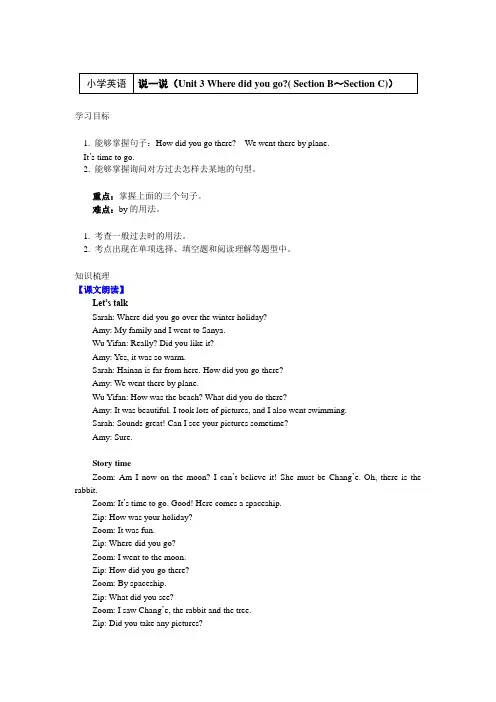
学习目标1. 能够掌握句子:How did you go there? We went there by plane.It’s time to go.2. 能够掌握询问对方过去怎样去某地的句型。
重点:掌握上面的三个句子。
难点:by的用法。
1. 考查一般过去时的用法。
2. 考点出现在单项选择、填空题和阅读理解等题型中。
知识梳理【课文朗读】Let’s talkSarah: Where did you go over the winter holiday?Amy: My family and I went to Sanya.Wu Yifan: Really? Did you like it?Amy: Yes, it was so warm.Sarah: Hainan is far from here. How did you go there?Amy: We went there by plane.Wu Yifan: How was the beach? What did you do there?Amy: It was beautiful. I took lots of pictures, and I also went swimming.Sarah: Sounds great! Can I see your pictures sometime?Amy: Sure.Story timeZoom: Am I now on the moon? I can’t believe it! She must be Chang’e. Oh, there is the rabbit.Zoom: It’s time to go. Good! Here comes a spaceship.Zip: How was your holiday?Zoom: It was fun.Zip: Where did you go?Zoom: I went to the moon.Zip: How did you go there?Zoom: By spaceship.Zip: What did you see?Zoom: I saw Chang’e, the rabbit and the tree.Zip: Did you take any pictures?Zoom: Yes, I did. Oops, where did I put the pictures?Zoom: Oh, it was a dream.【句子赏析】1. How did you go there? 你们怎么去那儿的?问句:How did +主语+go+其他?这个问句用来询问对方过去去某地的出行方式,用特殊疑问词how 提问。
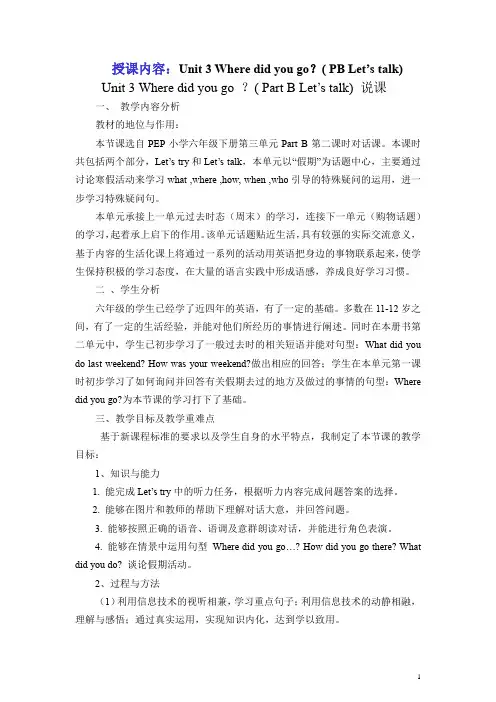
授课内容:Unit 3 Where did you go?( PB Let’s talk)Unit 3 Where did you go ?( Part B Let’s talk) 说课一、教学内容分析教材的地位与作用:本节课选自PEP小学六年级下册第三单元Part B第二课时对话课。
本课时共包括两个部分,Let’s try和Let’s talk,本单元以“假期”为话题中心,主要通过讨论寒假活动来学习what ,where ,how, when ,who引导的特殊疑问的运用,进一步学习特殊疑问句。
本单元承接上一单元过去时态(周末)的学习,连接下一单元(购物话题)的学习,起着承上启下的作用。
该单元话题贴近生活,具有较强的实际交流意义,基于内容的生活化课上将通过一系列的活动用英语把身边的事物联系起来,使学生保持积极的学习态度,在大量的语言实践中形成语感,养成良好学习习惯。
二、学生分析六年级的学生已经学了近四年的英语,有了一定的基础。
多数在11-12岁之间,有了一定的生活经验,并能对他们所经历的事情进行阐述。
同时在本册书第二单元中,学生已初步学习了一般过去时的相关短语并能对句型:What did you do last weekend? How was your weekend?做出相应的回答;学生在本单元第一课时初步学习了如何询问并回答有关假期去过的地方及做过的事情的句型:Where did you go?为本节课的学习打下了基础。
三、教学目标及教学重难点基于新课程标准的要求以及学生自身的水平特点,我制定了本节课的教学目标:1、知识与能力1. 能完成Let’s try中的听力任务,根据听力内容完成问题答案的选择。
2. 能够在图片和教师的帮助下理解对话大意,并回答问题。
3. 能够按照正确的语音、语调及意群朗读对话,并能进行角色表演。
4. 能够在情景中运用句型Where did you go…? How did you go there? What did you do? 谈论假期活动。
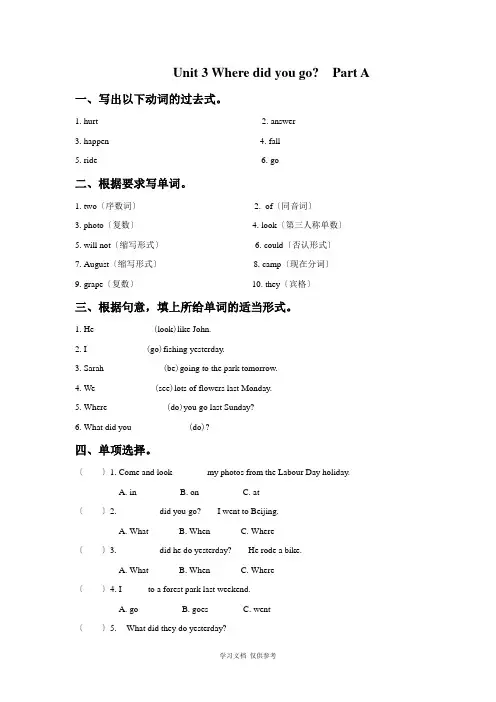
Unit 3 Where did you go?Part A一、写出以下动词的过去式。
1.hurt _______________________2.answer ______________________3.happen _____________________4.fall __________________________5.ride ________________________6.go___________________________二、根据要求写单词。
1.two〔序数词〕____________________2. of〔同音词〕_____________________3.photo〔复数〕____________________4.look〔第三人称单数〕______________5.will not〔缩写形式〕_______________6.could〔否认形式〕_________________7.August〔缩写形式〕________________8.camp〔现在分词〕_________________9.grape〔复数〕_______________________ 10.they〔宾格〕_____________________三、根据句意,填上所给单词的适当形式。
1.He _____________(look)like John.2.I _____________(go)fishing yesterday.3.Sarah _____________(be)going to the park tomorrow.4.We _____________(see)lots of flowers last Monday.5.Where _____________(do)you go last Sunday?6.What did you_____________(do)?四、单项选择。
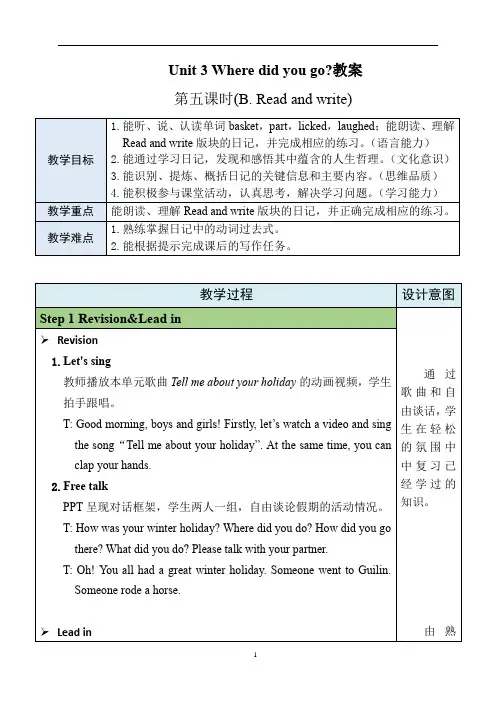
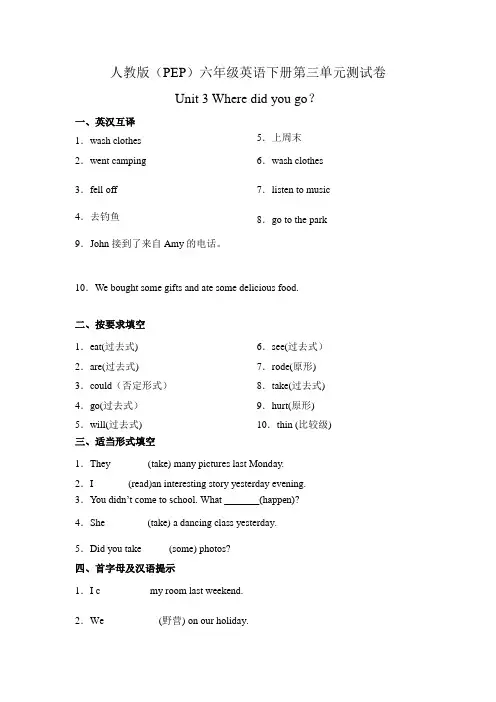
人教版(PEP)六年级英语下册第三单元测试卷Unit 3 Where did you go?一、英汉互译1.wash clothes_____________ 2.went camping_________3.fell off ___________________ 4.去钓鱼________________ 5.上周末__________ 6.wash clothes __________ 7.listen to music __________ 8.go to the park __________9.John接到了来自Amy的电话。
________________________________________________ 10.We bought some gifts and ate some delicious food.__________________________________________________ 二、按要求填空1.eat(过去式)_____________ 2.are(过去式)_____________ 3.could(否定形式)______ 4.go(过去式)_________ 5.will(过去式)___________ 6.see(过去式)_________ 7.rode(原形)__________ 8.take(过去式)______________ 9.hurt(原形)__________ 10.thin (比较级)____________三、适当形式填空1.They _______(take) many pictures last Monday. 2.I ______ (read)an interesting story yesterday evening. 3.You didn’t come to school. What _______(happen)? 4.She ________(take) a dancing class yesterday. 5.Did you take _____(some) photos?四、首字母及汉语提示1.I c__________my room last weekend.2.We __________ (野营) on our holiday.3.I ___________(骑马) last weekend.4.Amy___________(骑自行车) yesterday.5.Mike __________ (脚受伤了) the day before yesterday.五、单项选择1.Did you __________ pictures in the zoo?A. takeB. tookC. taking2.I often __________ shopping on the weekend, but I __________ go last weekend.A. go; don’tB. went; didn’tC. go; didn’t3.We ________ yesterday.A. go swimB. went swimmingC. go swimming4.Tim ________ his bike yesterday.A.fall off B.fell off C.fall of5.Where did she _____?A.go B.went C.goes6.Mike _________ up and made a funny play.A. dressedB. dressesC. dressing7.What did you see there?一we saw _______ grapes.A. lot ofB. a lots ofC. lots of8.A:___________you watch TV last night? B: Yes, I watched TV.A.DidB.DoC.Does9.Those days ______ sunny.A. wasB. wereC. is10.-Did you go to Beijing? -_________A. Yes, I did.B. Yes, I do.C. No, we don’t.六、读句子,选择相符的图片。
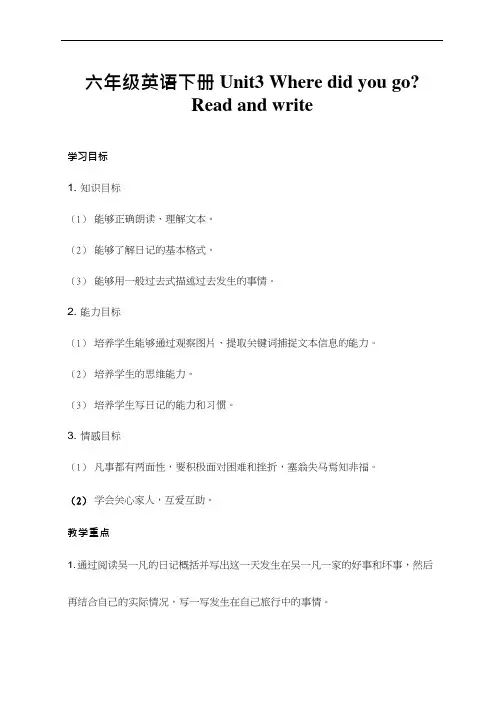
六年级英语下册Unit3 Where did you go?
Read and write
学习目标
1. 知识目标
(1)能够正确朗读、理解文本。
(2)能够了解日记的基本格式。
(3)能够用一般过去式描述过去发生的事情。
2. 能力目标
(1)培养学生能够通过观察图片、提取关键词捕捉文本信息的能力。
(2)培养学生的思维能力。
(3)培养学生写日记的能力和习惯。
3. 情感目标
(1)凡事都有两面性,要积极面对困难和挫折,塞翁失马焉知非福。
(2)学会关心家人,互爱互助。
教学重点
1. 通过阅读吴一凡的日记概括并写出这一天发生在吴一凡一家的好事和坏事,然后再结合自己的实际情况,写一写发生在自己旅行中的事情。
2. 明白“塞翁失马,焉知非福”,通过努力坏的事情可以变成好事。
教学难点
培养学生从语篇中捕捉不同类型信息和思考的能力。
教具
板书词条,Robin 和小狗卡片,哭、笑脸卡片,学生任务单,智慧教室课件教学过程
as
a
bike with my daughter.
was
What
they
come
for three people. Max sat in a basket on the front of
is missing! Where is Max? Who can come here and
or
the
good. things
the read finish
Group
out
Read afternoon,
When you meet bad things.。
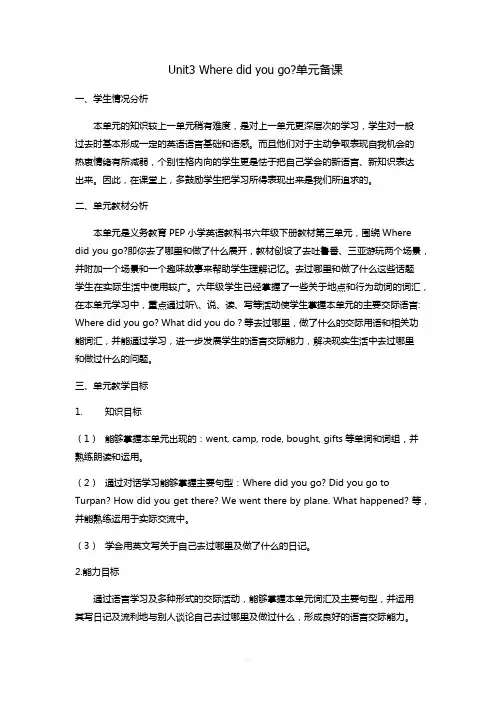
Unit3 Where did you go?单元备课一、学生情况分析本单元的知识较上一单元稍有难度,是对上一单元更深层次的学习,学生对一般过去时基本形成一定的英语语言基础和语感。
而且他们对于主动争取表现自我机会的热衷情绪有所减弱,个别性格内向的学生更是怯于把自己学会的新语言、新知识表达出来。
因此,在课堂上,多鼓励学生把学习所得表现出来是我们所追求的。
二、单元教材分析本单元是义务教育PEP小学英语教科书六年级下册教材第三单元,围绕Where did you go?即你去了哪里和做了什么展开,教材创设了去吐鲁番、三亚游玩两个场景,并附加一个场景和一个趣味故事来帮助学生理解记忆。
去过哪里和做了什么这些话题学生在实际生活中使用较广。
六年级学生已经掌握了一些关于地点和行为动词的词汇,在本单元学习中,重点通过听\、说、读、写等活动使学生掌握本单元的主要交际语言: Where did you go? What did you do?等去过哪里,做了什么的交际用语和相关功能词汇,并能通过学习,进一步发展学生的语言交际能力,解决现实生活中去过哪里和做过什么的问题。
三、单元教学目标1. 知识目标(1)能够掌握本单元出现的:went, camp, rode, bought, gifts等单词和词组,并熟练朗读和运用。
(2)通过对话学习能够掌握主要句型:Where did you go? Did you go to Turpan? How did you get there? We went there by plane. What happened? 等,并能熟练运用于实际交流中。
(3)学会用英文写关于自己去过哪里及做了什么的日记。
2.能力目标通过语言学习及多种形式的交际活动,能够掌握本单元词汇及主要句型,并运用其写日记及流利地与别人谈论自己去过哪里及做过什么,形成良好的语言交际能力。
3.情感态度目标通过本课学习,能养成主动用英语交际的习惯和关心他人的良好品德。
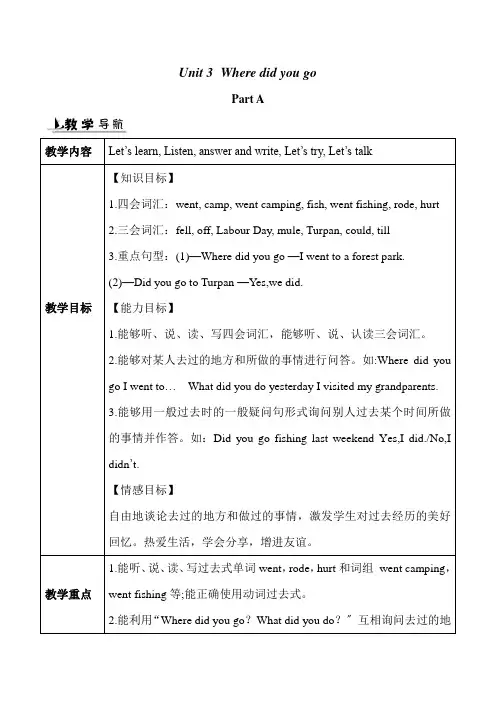
Unit 3 Where did you goPart A教学内容Let’s learn, Listen, answer and write, Let’s try, Let’s talk教学目标【知识目标】1.四会词汇:went, camp, went camping, fish, went fishing, rode, hurt2.三会词汇:fell, off, Labour Day, mule, Turpan, could, till3.重点句型:(1)—Where did you go —I went to a forest park. (2)—Did you go to Turpan —Yes,we did.【能力目标】1.能够听、说、读、写四会词汇,能够听、说、认读三会词汇。
2.能够对某人去过的地方和所做的事情进行问答。
如:Where did you go I went to…What did you do yesterday I visited my grandparents.3.能够用一般过去时的一般疑问句形式询问别人过去某个时间所做的事情并作答。
如:Did you go fishing last weekend Yes,I did./No,I didn’t.【情感目标】自由地谈论去过的地方和做过的事情,激发学生对过去经历的美好回忆。
热爱生活,学会分享,增进友谊。
教学重点1.能听、说、读、写过去式单词went,rode,hurt和词组went camping,went fishing等;能正确使用动词过去式。
2.能利用“Where did you go?What did you do?〞互相询问去过的地方和做过的事情,并能根据实际情况灵活作答。
教学难点1.掌握本局部的新单词并利用过去式的变化进行描述。
2.灵活运用“Where did you go?〞“What did you do?〞谈论去过的地方和做过的事情。
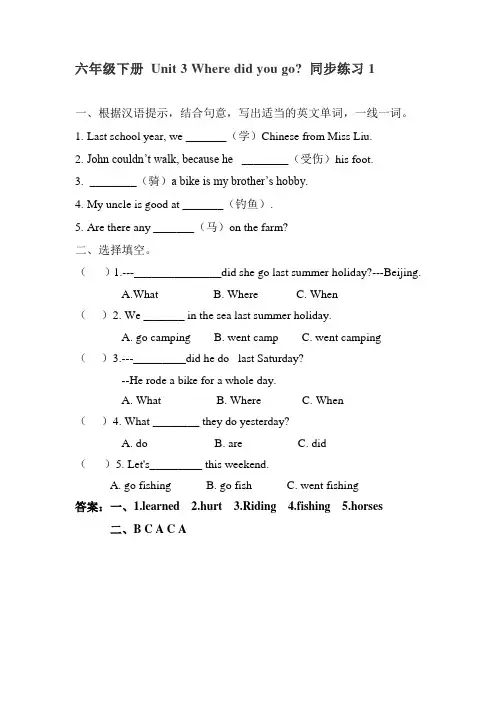
一、根据汉语提示,结合句意,写出适当的英文单词,一线一词。
st school year, we _______(学)Chinese from Miss Liu.2.John couldn’t walk, because he________(受伤)his foot.3. ________(骑)a bike is my brother’s hobby.4.My uncle is good at _______(钓鱼).5.Are there any _______(马)on the farm?二、选择填空。
()1.---_______________did she go last summer holiday?---Beijing.A.WhatB. WhereC. When()2. We _______ in the sea last summer holiday.A. go campingB. went campC. went camping()3.---_________did he do last Saturday?--He rode a bike for a whole day.A. WhatB. WhereC. When()4. What ________ they do yesterday?A. doB. areC. did()5. Let's_________ this weekend.A. go fishingB. go fishC. went fishing答案:一、1.learned 2.hurt 3.Riding 4.fishing 5.horses二、B C A C A()1. I ____ a horse in Xinjiang over the Labour Day.A. RideB. rodeC. am riding()2. It’s much ________than it ______yesterday.A. cold ... wasB. colder... isC. colder...was()3. We saw _______grapes there.A lot B. lots of C.lot of()4. The grapes won’t _____till August.A. be readyB. readyC. are ready()5. It ______ like a mule.A. LookingB. lookC. looks.()6. He ______feel well last night.A. didn’tB. doesn’tC. isn’t()7.We _______ Beijing next month.A. VisitB. visitedC. are going to visit. ()8. She likes ______ pictures of the beach.A. TookB. takesC. taking()9. It _______ tomorrow.A. won’t rainyB. isn't rainC.won't be rainy ()10. Did your father like _____________?A. going boatingB. going boatC. went boating 答案:1--5 B C B A C 6--10 A C C C A一、选择填空()1. A: How ______ your summer holiday? B: It was good.A. wasB. didC. Is()2. My mum ______ a bike on Children’s Day.A. buys myB. bought meC. Buyed()3. Let’s _____ this afternoon.A. go fishingB. went fishingC. go fish()4. Is she ______ pictures in the forest?A. TakeB. takingC. take()5. Harbin is _______ Guangzhou.A.far toB. near fromC. far from二、根据所给的中文提示,完成横线上所缺的单词。
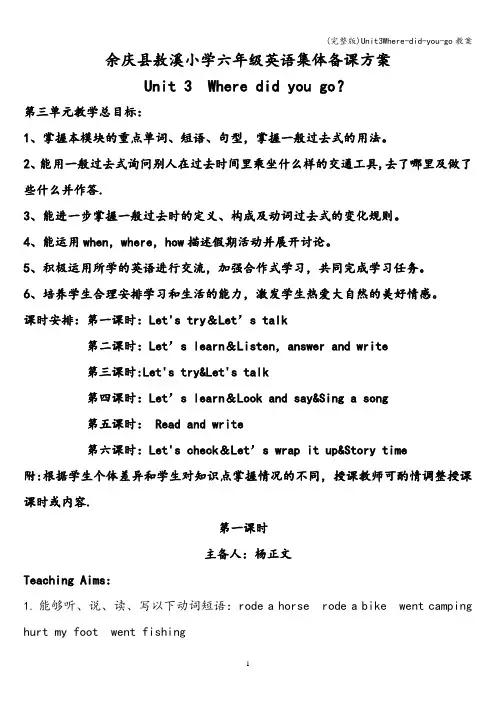
余庆县敖溪小学六年级英语集体备课方案Unit 3 Where did you go?第三单元教学总目标:1、掌握本模块的重点单词、短语、句型,掌握一般过去式的用法。
2、能用一般过去式询问别人在过去时间里乘坐什么样的交通工具,去了哪里及做了些什么并作答.3、能进一步掌握一般过去时的定义、构成及动词过去式的变化规则。
4、能运用when,where,how描述假期活动并展开讨论。
5、积极运用所学的英语进行交流,加强合作式学习,共同完成学习任务。
6、培养学生合理安排学习和生活的能力,激发学生热爱大自然的美好情感。
课时安排:第一课时:Let's try&Let’s talk第二课时:Let’s learn&Listen,answer and write第三课时:Let's try&Let's talk第四课时:Let’s learn&Look and say&Sing a song第五课时: Read and write第六课时:Let's check&Let’s wrap it up&Story time附:根据学生个体差异和学生对知识点掌握情况的不同,授课教师可酌情调整授课课时或内容.第一课时主备人:杨正文Teaching Aims:1.能够听、说、读、写以下动词短语:rode a horse rode a bike went camping hurt my foot went fishing2。
能够运用一般过去时询问别人在过去的某个时间点去哪里及所做的事情并做答。
Teaching Key and Difficult points:1. 本课时的教学重点是掌握5个动词短语的过去式形式。
2.本课时的教学难点是以下两个句子的运用:Where did you go last Saturday?What did you do there?教师要多示范,通过有针对性的反复操练知道学生熟练掌握。
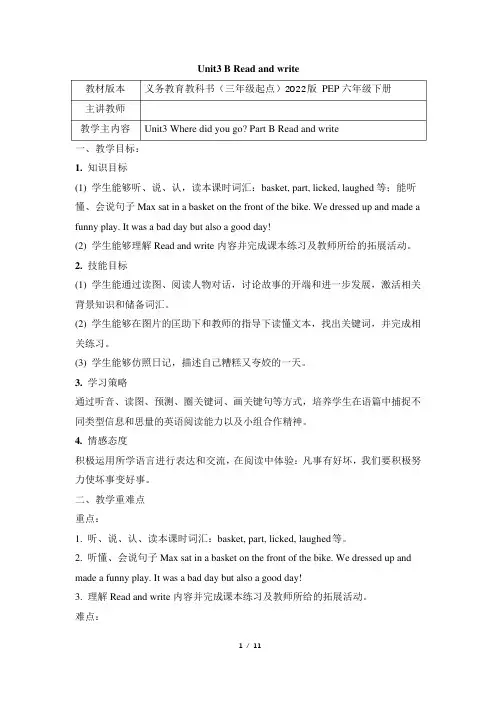
Unit3 B Read and write教材版本义务教育教科书(三年级起点)2022版PEP六年级下册主讲教师教学主内容Unit3 Where did you go? Part B Read and write一、教学目标:1. 知识目标(1) 学生能够听、说、认,读本课时词汇:basket, part, licked, laughed等;能听懂、会说句子Max sat in a basket on the front of the bike. We dressed up and made a funny play. It was a bad day but also a good day!(2) 学生能够理解Read and write内容并完成课本练习及教师所给的拓展活动。
2. 技能目标(1) 学生能通过读图、阅读人物对话,讨论故事的开端和进一步发展,激活相关背景知识和储备词汇。
(2) 学生能够在图片的匡助下和教师的指导下读懂文本,找出关键词,并完成相关练习。
(3) 学生能够仿照日记,描述自己糟糕又夸姣的一天。
3. 学习策略通过听音、读图、预测、圈关键词、画关键句等方式,培养学生在语篇中捕捉不同类型信息和思量的英语阅读能力以及小组合作精神。
4. 情感态度积极运用所学语言进行表达和交流,在阅读中体验:凡事有好坏,我们要积极努力使坏事变好事。
二、教学重难点重点:1. 听、说、认、读本课时词汇:basket, part, licked, laughed等。
2. 听懂、会说句子Max sat in a basket on the front of the bike. We dressed up and made a funny play. It was a bad day but also a good day!3. 理解Read and write内容并完成课本练习及教师所给的拓展活动。
难点:仿照日记或者范例,书写自己糟糕又夸姣的一天。
Unit 3 Where did you go ?教学目标知识与能力目标●能够听、说、读、写句型:Where did you go ? Did you… ? Yes, we did . No, wedidn’t. How did you go there ?●能够在情景中运用句型:Where did you go ? Did you … ? Yes, we did. No, wedidn’t. How did you go there ? 询问并回答别人在过去的时间里去了哪里,乘坐什么交通工具。
●能够听、说、读、写单词: rode a horse, rode a bike, went camping, went fishing, hurt my foot, took pictures, went swimming, ate fresh food, bought gifts.能够正确使用上述词组谈论和描述人物在过去做的事情●了解新疆的风土人情。
课时安排6课时第一课时教学内容 A. Let’s try Let’s talk课型对话教学教学目标●学生能够听、说、读、写句子:What happened ? Are you all right ? I’mOK now. Where d id you go ? It looks like a mule ! Did you go to Turpan ?Yes, we did.●能够独立完成Let’s try 中的听力练习。
●教育学生懂得与他人分享旅行中的经历。
教学重点难点●在实际情景中灵活运用句型:Where did you go ? I went to…? 来与他人进行交流。
教学准备课件、图片教学步骤:Step 1. Warm-up1.利用图片和学生一起唱歌谣,要求一边唱一边做动作。
如:What can you do ? I can sing.What can you do ? I can dance.What can you do ? I can climb a mountain.What can you do ? I can take a pictures.What can you do ? I can speak Chinese.2.用多媒体课件展示自己外出旅游的照片,并做相关介绍。
Unit 3 Where did you go?•建立事物都有两面的观念,好事坏事没有绝对,可以相互转换,因此要以乐观的心态面对生活•能够通过看图捕捉关键信息,并根据相关提示完成听前预测课时安排第一课时:Part A Let’s try & Let’s ta lk第二课时:Part A Let’s learn & Listen, answer and write第三课时:Part B Let’s try & Let’s talk第四课时:Part B Let’s learn & Look and say第五课时:Part B Read and write第六课时:Part B Let’s check & Let’s wrap it upThe first period(第一课时)Part A Let’s try & Let’s talk▶教学内容与目标课时教学内容课时教学目标Let’s try•能够读懂题目要求,学会听前预测听力的重点内容。
•能够运用基本听力技巧完成本部分的听力任务。
•能够通过听力活动获得Let’s talk板块的相关信息,为下面的对话学习做准备。
Let’s talk•能够在图片和教师的帮助下理解对话大意,并回答对话下面的问题。
•能够在语境中理解生词或短语“fell off, Labour Day, mule,Turpan, could, till”的意思,并能正确发音。
•能够通过对话了解新疆的风土人情。
•能够用正确的语音、语调及意群朗读对话,并能进行角色表演。
•能够在情景中恰当运用由where和what引导的一般过去时的特殊疑问句。
▶教学重点能够在情景中运用句型“—Where did you go over your holiday? —I went to…” “—What did you do? —I…”谈论去过的地方和所做过的事情。